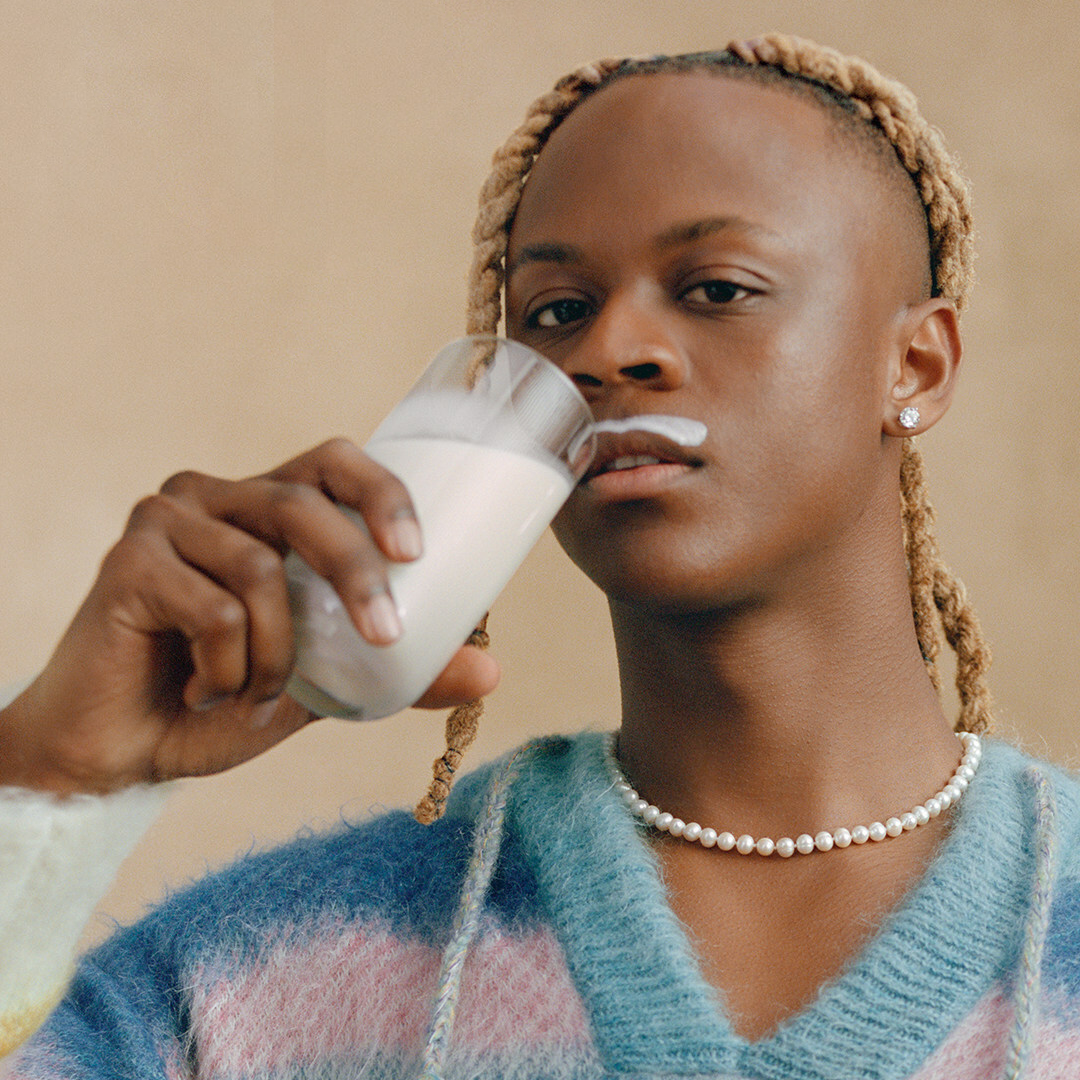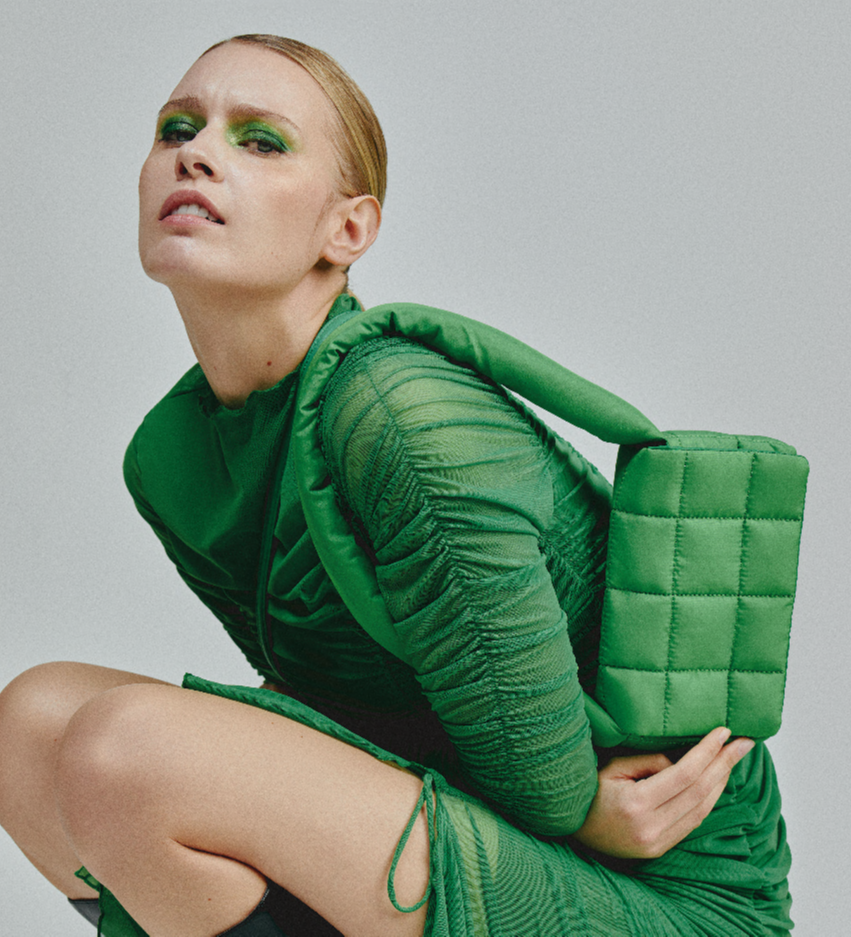03 : 03 : 23 : Weekly Debrief
This week: A 3D-printed eco-clothing store, nepo-babies take on plant milk, digital African fashion, IBS ad hijacks LFW and the future of the four day work week.
1. Ecoalf opens 3D-printed clothing store made of 100% recycled plastic
Spain – Conscious fashion brand Ecoalf and Nagami, a design studio specialising in sustainable architecture, have opened a 90-square-metre store made entirely of 3D-printed recycled plastic.
The stunning installation in Las Rozas Village, Madrid, takes customers into a glacier-inspired space with walls, shelves and display tables made from 3.3 tonnes of plastic. Ecoalf incorporated its sustainable fashion, accessories and footwear lines into the room. The designers aim to raise awareness of how 75% of all areas covered by glaciers have melted due to rising temperatures over the past 50 years.
‘3D printing allows us to bring unimaginable spaces to life. The latter are produced locally not only by using recycled materials, but by establishing production chains that are cleaner, more sustainable and flexible. This is already a reality,’ says Manuel Jiménez García, co-founder and CEO of Nagami.
In Hyperphysical Stores, we analyse how retailers rethink bricks-and-mortar stores to make them engaging, sensorial and memorable. Ecoalf is taking this further with an innovative, awe-inspiring and inherently political shopping experience.
2. Silk Nextmilk enlists nepo babies in Got Plant-based Milk campaign
US – Plant-based Silk Nextmilk recreated an iconic 1990s pro-dairy advert by replacing the celebrities who first posed with a milk moustache with their children.
David Beckham, Shaquille O’Neal, John Travolta and model Christie Brinkley helped rebrand milk and dairy produce via the Got Milk campaign created in 1994 by advertising agency Goodby Silverstein & Partners for the California Milk Processor Board. Their children are now following the same path, except they are promoting Danone’s plant-based milk brand, Silk.
We’ve previously covered how upcoming brands are making the dairy aisle more sustainable. As consumers (especially Gen Z and Gen Alpha) seek a balance between sustainability, health and taste, the plant-based food and drinks industry has to keep innovating.
 Silk, US
Silk, US
3. Digital African fashion is coming to The Witcher and Minecraft
France – A new campaign by Orange spotlights the lack of cultural representation in gaming and introduces a diversification of avatar skin tones and fashion honouring under-represented communities.
Africa and the Middle East are emerging as gaming hotspots, but local players don’t see themselves represented on screen. That’s why French telecoms company Orange and media firm Publicis created Cultural Avatars. Gamers from the Middle East and North Africa (MENA) region can now wear their traditional outfits in The Witcher, Minecraft and other virtual realities.
Orange enlisted three young designers from northern Africa, the sub-Saharan region and Madagascar to create culturally relevant designs. The latter brought their vision and expertise to the team of gaming developers who turned traditional fashion into video game attire.
With Cultural Avatars, Orange stresses the need for more diverse narratives in gaming. We previously highlighted in Affirmative Avatars how netizens interested in gaming and digital fashion are a diverse group of distinct identities, values and aesthetics who wants to feel represented.
 Buscopan. Creative by MRM Spain, UK
Buscopan. Creative by MRM Spain, UK
4. Buscopan hijacks London Fashion Week with IBS advert
UK – Against the backdrop of London Fashion Week, healthcare brand Buscopan launched the Fashion Cramps campaign, raising awareness of Irritable Bowel Syndrome (IBS) through a humorous shoot where high fashion meets cramps.
Fashion and IBS seemingly don’t have much in common, yet Buscopan and marketing agency MRM Spain used the media clout of London Fashion Week to draw attention to the digestive condition. The campaign draws an amusing parallel between the discomfort caused by IBS and the awkward poses of models in editorial-styled fashion imagery.
This unusual approach suggests that healthcare marketing can be creative and look beyond the medical field. ‘London Fashion Week was the perfect moment for Fashion Cramps, due to the intertwined relationships between this high-stress event and the symptoms of those suffering from the issues that Buscopan seeks to alleviate,’ explains Félix del Valle, chief creative officer at MRM Spain.
The growing interest in pre- and probiotic categories and efforts like Buscopan’s tie-up with popular culture indicate the potential of the Gut Health Market to further advance from niche to mainstream.
5. Stat: The promising results of the four-day working week trial
UK – Could a four-day working week become the norm? As the largest pilot scheme to date came to an end, non-profit organisation 4 Day Week Global has revealed the overwhelmingly positive outcomes.
Since June 2022, nearly 3,000 UK-based employees took part in 4 Day Week Campaign, a six-month trial giving staff the opportunity to take an extra day off every week while remaining on the same salary. Companies taking part in the four-day week pilot were also offered workshops and mentoring to adjust to these changes, and to help employees manage their time to avoid productivity loss.
A survey revealed that 39% of employees felt less stressed and 54% experienced better work-life balance while working 32 hours weekly. The average number of sick days taken also dropped. The model seems to have convinced companies as well – over nine in 10 decided to extend the new working pattern, while 30% have made four-day weeks a permanent company policy. Providing wellbeing benefits and permitting equal if not heightened productivity, shorter working weeks are a development sure to define the future of work.
To future-proof your world, visit The Future Laboratory's forecasting platform LS:N Global for daily news, opinions, trends, sector specific insights, and strategic toolkits.
Want to read more?
Become a member today!
Sign up to one of our trends intelligence platform, LS:N Global and get unlimited access to a hive of insights - from microtrends and macro trends to market reports, daily news, research across eight industry sectors and much more.
Discover our memberships
Already a member? Click here to login
